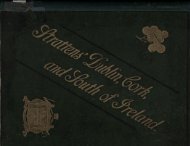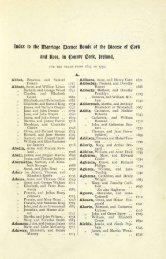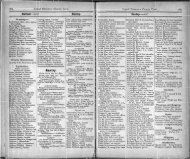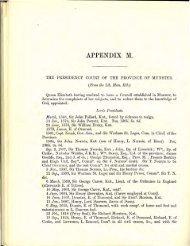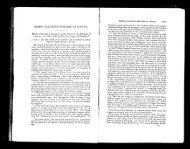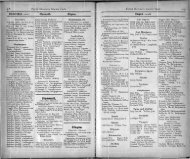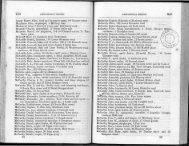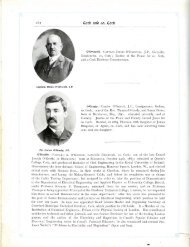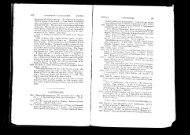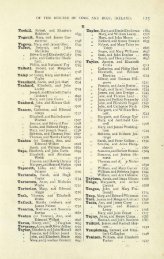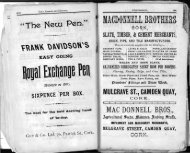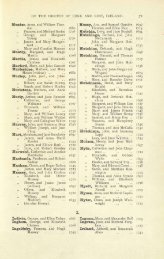THE DEPOPULATION OF IRELAND - Cork Past & Present
THE DEPOPULATION OF IRELAND - Cork Past & Present
THE DEPOPULATION OF IRELAND - Cork Past & Present
You also want an ePaper? Increase the reach of your titles
YUMPU automatically turns print PDFs into web optimized ePapers that Google loves.
<strong>THE</strong> <strong>DEPOPULATION</strong> <strong>OF</strong> <strong>IRELAND</strong>.<br />
<strong>THE</strong> Census Returns, when pub1ished,<br />
will enable us to ascertain, in some degree,<br />
the extent of the combined ravages of<br />
famine and pestilence, in the first place,<br />
and of despair and emigration, in the<br />
second, in the depopulation of Ireland. But<br />
even these returns, authentic as they will<br />
be, cannot be complete; or the emigration<br />
that has gone on since the census was<br />
taken, and which still continues, will<br />
compel the statist to make large<br />
deductions from the amount which the<br />
census will yield, if he wish to ascertain<br />
the real number of the Irish people. The<br />
annals of the modern world offer no such<br />
record as that presented in the history of<br />
Ireland, since the memorab1e and<br />
deplorable years of the potato famine, and<br />
of the pestilence that followed in its track.<br />
The splendid emigrant ships that ply<br />
between Liverpool and New York, and<br />
which have sufficed in previous years to<br />
carry to the shores of America an Irish<br />
emigration, amounting on the average to<br />
250,000 souls per annum, have, during the<br />
present spring, been found insufficient to<br />
transport to the States the increasing<br />
swarms of Irish who have resolved to try<br />
in the New World to gain the<br />
independence which has been denied them<br />
in the old.<br />
"Emigration," says a letter dated a few<br />
days back, "is proceeding to an extent<br />
altogether unprecedented; but much less,<br />
in proportion, from Ulster than the other<br />
provinces. From most of the southern<br />
counties, the small farmers are hastening<br />
in vast numbers; and even in Leinster the<br />
mania for emigration prevails far and<br />
wide. The remittances from America arc<br />
far greater in amount than in any previous<br />
year, and considerable sums are paid by<br />
the banks and by private commercial<br />
establishments, from day to day, on orders<br />
from the United States. From some<br />
districts in Ulster, numbers of the smaller<br />
tenantry are taking their departure. From<br />
one of the principal estates in Monaghan<br />
nearly one thousand persons of the cottier<br />
class are about to be sent to Canada at the<br />
expense of the landlord, who, it is stated,<br />
has made arrangements for providing them<br />
with a comfortable passage, and some<br />
small allowance of money to each family<br />
after reaching the port of their<br />
destination."<br />
The number of emigrant vessels<br />
proceeding to America direct from Irish<br />
ports is quite unprecedented, and is one of<br />
the most extraordinary circumstances of<br />
the time.<br />
Within eight days, the following eleven<br />
vessels, carrying 1568 passengers, sailed<br />
from the single port of <strong>Cork</strong>:—The<br />
Dominique, for Quebec, 150 passengers;<br />
the Don, for New York, 160; the<br />
Lockwoods, for New York, 280: the<br />
Marchioness of Bute, for Quebec, 120; the<br />
Sara, for Boston, 104; the Solway, for<br />
NewYork, 196; the Try Again, for Quebec,<br />
130; the Favourite. for Boston, 120; the<br />
Clarinda, for New York, 100; the Swift,<br />
for Boston, 120; the Field Marshal<br />
Radetzk'y, for Kew York, 88 passengers,<br />
In addition to those vessels, the Hotspur<br />
went down the <strong>Cork</strong> river, on Tuesday,<br />
with 100 paupers on board, from the<br />
Kenmare Union house.<br />
But what is most remarkable is, that,<br />
while this enormous emigration is going<br />
on, leading to a fear in some parts of the<br />
country that sufficient people will not be<br />
left to cultivate the land, the owners or<br />
mortgages of Irish estates continue to evict<br />
their tenantry with as much virulence as<br />
ever. The Galway Vindicator states:—<br />
“There were 195 ejectments entered—13<br />
at the suit of the trustees of A. H. Lynch,<br />
one of Mathew S. Coneys, and 181 were<br />
brought by the Law Life Insurance<br />
Company; and of 183 entries of civil bills,<br />
87 were at the suit of the insurance<br />
company. With the exception of three or<br />
four, the ejectments were all undefended.<br />
They were disposed of at the rate of one<br />
each minute; so that; taking an average of<br />
five souls to each family ejected, we will<br />
have 300 per hour, and in the entire 905<br />
human beings cast upon poor-house<br />
relief.”<br />
The same journal estimates the total<br />
evictions in Connemara during the present<br />
season at upwards of 4000. In Limerick<br />
and Kerry the same system is carried on;<br />
the evicted remaining in the union<br />
workhouse until remittances arrive from<br />
their friends in America, when they shake<br />
from their feet the dust of their native<br />
land, and rejoin their friends and relations<br />
across the Atlantic.<br />
The following letter from our<br />
Correspondent in <strong>Cork</strong>—accompanying a<br />
series of Sketches, which we have<br />
engraved for our present Number—gives<br />
the latest information upon this interesting<br />
subject:<br />
(From our Correspondent at <strong>Cork</strong>.)<br />
"The constant appearance of the heading'<br />
Emigration from Ireland,' and the no less<br />
constant stream of well-clad, healthy, and<br />
comfortable-looking peasantry in our<br />
streets, induces me to send you the<br />
accompanying sketches and<br />
communications on that subject.<br />
"Upon reference to notes and papers of my<br />
own, and to information afforded me by<br />
the emigration agents here, I am disposed<br />
to think that about the middle of May the<br />
great emigrational torrent ceases to flow<br />
from these shores. Looking backward for<br />
the last month, I find that, during the week<br />
ending April 11 the greatest rush for the<br />
season took place. The numbers who left<br />
<strong>Cork</strong> that week would not have fallen far<br />
short of 1500 souls, and this with the<br />
emigration of the other ports of Limerick,<br />
Waterford, Dublin, and even of Belfast,<br />
will give us an approach to 5000 weekly<br />
leaving the country. Large as this number<br />
may appear, it is well known that it is<br />
considerably below the mark when the<br />
departures for Liverpool are included. One<br />
agent informed me that he himself had<br />
booked 600 emigrants in four days, and<br />
yet he is but one of the many agents who<br />
are to be met with not alone in the large<br />
towns and seaports, but even thickly<br />
scattered through each petty town and<br />
village throughout the country. In England<br />
you can have but little conception of the<br />
sufferings of the poor Irish emigrant from<br />
the time he first announces his intention of<br />
leaving home to his final departure; nor,<br />
indeed, can it be understood even in this<br />
country, except by those who make it their<br />
business to investigate the subject.<br />
Impressed with this belief, and being<br />
desirous of witnessing some of the<br />
partings of the emigrants from amidst the<br />
scenes of their youth, I took, a few days<br />
since, a run into the south-west of the<br />
county, from whence the great stream<br />
pours into the city of <strong>Cork</strong>. In my ramble I<br />
fell in with a clergyman, who was there on<br />
his way to take leave of a large number of<br />
his parishioners, who were then packing<br />
up.<br />
“None perhaps feel more severely the<br />
departure of the peasantry than the Roman<br />
Catholic clergy; as from them, and them<br />
alone, it may be said, comes the sole<br />
means of support which they receive. Yet<br />
none take a more active part in seeing<br />
them safely out of the country, or have<br />
looked more closely to the interest of<br />
those they leave behind, than those<br />
clergymen, even though their revenues are<br />
reduced, in most cases, to one-half, and in<br />
some to one-third. In company with one of<br />
these humble but exemplary men, I came<br />
to a sharp turn in the road, in view of that<br />
(or which we sought, and of which I send<br />
you a sketch, namely, the packing and<br />
making ready of, I may say, an entire<br />
village—for there were not more than<br />
half-a-dozen houses on the spot, and all<br />
their former inmates were preparing to<br />
leave. Immediately that my rev. friend
was recognised, the people gathered about<br />
him in the most affectionate manner. He<br />
had a word of advice to Pat, a caution to<br />
Nelly, a suggestion to Mick; and he made<br />
a promise to Dan to take care of the "old<br />
woman," until the five pounds came in the<br />
spring to his 'Reverence' to send her over<br />
to America. Then ensued a scene of tears<br />
and lamentation, such as might a have<br />
softened a much harder heart than mine or<br />
that of the priest. He stood for awhi1e<br />
surrounded by the old and the young, the<br />
strong and infirm, on bended knees, and<br />
he turned his moistened eyes towards<br />
heaven, and asked the blessing of the<br />
Almighty upon the wanderers during their<br />
long and weary journey. Many were the<br />
tears brushed quietly away from the<br />
sunburnt cheeks of those who there knelt,<br />
and had implicit faith that the benediction<br />
so fervently and piously asked, would be<br />
vouchsafed to them.<br />
"It was not pleasant to linger amid a<br />
scene like this; so to dispel our sadness,<br />
we took a last farewell of the group, and<br />
ere long found ourselves upon the road to<br />
Kenmare, and in the midst of a train of<br />
from 200 to 300 men and women, boys<br />
and girls, varying in age from ten to thirty<br />
years. They looked most picturesque in<br />
their gay plaid shawls and straw bonnets,<br />
and were all on their way to <strong>Cork</strong>, to go on<br />
board the emigrant ship.<br />
"Upon inquiry I was given to understand<br />
that this was but one of the many groups<br />
sent from the union houses throughout the<br />
country, and at the expense of the<br />
ratepayers, This, though an expensive<br />
process, is better than to leave them to<br />
pine and perish with want, as in the too<br />
wretched union of Kilrush; yet it is sad to<br />
see so much young blood sent from<br />
amongst us, and that too, as a gentleman,<br />
an extensive farmer in the county of<br />
Kerry, told me, at a period when it is<br />
found difficult to obtain hands to do the<br />
necessary farm-work. To so great an<br />
extent has this extraordinary emigration<br />
mania been carried in the county of<br />
Kerry, that this gentleman told me that he<br />
had been obliged even thus early to<br />
engage farm labourers at Millstreet, in the<br />
county of <strong>Cork</strong>, to take in his harvest in<br />
the county of Kerry during the coming<br />
season. Moreover, he stated that he was<br />
not the only one in the county who would<br />
be obliged to have recourse to the same<br />
means of procuring labourers. It would be<br />
strange indeed, that Ireland, who, at one<br />
time was able to supply with her<br />
superabundant labour the farmers of<br />
England and Wales, should be obliged to<br />
seek in the English and Welsh fields for<br />
hands to do her work. Yet it is quite<br />
possible that such a thing may happen.<br />
"Having seen sufficient of the country, I<br />
turned my steps towards the city, and upon<br />
my arrival there, first sought out the<br />
houses of the strangers who frequently are<br />
obliged to remain in lodging-houses from<br />
one to the or six days, according to<br />
circumstances. I can assure you that it is<br />
not exaggerating the abject misery of these<br />
miscalled 'lodging-houses for emigrants.'<br />
It is no unusual thing to thrust from twenty<br />
to forty persons, of all ages and both<br />
sexes, into rooms not more than four yards<br />
by five or six yards square, with no other<br />
accommodation than a mass of filthy<br />
straw, placed around the room, upon<br />
which the weary traveler is expected to<br />
find repose. In the event of his being<br />
provided by the proprietor with some sort<br />
of covering, he is charged threepence a<br />
night; should they bring their own bedclothes,<br />
they pay twopence; and those who<br />
are content to sleep on the straw, without<br />
divesting themselves of their rags, pay one<br />
penny<br />
"For standing room where they may<br />
breakfast or dine—for it cannot be called<br />
accommodation—the charges are pretty<br />
much on the same scale. On the whole, it<br />
is fortunate that the great business of<br />
emigration is generally over before the<br />
setting-in of the warm weather, otherwise<br />
these lodging-houses, from their overcrowded<br />
state, as well as from the<br />
accumulated amount of filth in them,<br />
would become perfect nuisances, and<br />
dangerous to the health of the community.<br />
Several years since, when landing for the<br />
first time on the French shore, I felt much<br />
harrassed by the untiring persecution of<br />
the hotel touters; but little did I dream of<br />
ever seeing the touting system carried to<br />
such a fearful extent as it now is in<br />
Ireland; for no sooner is the red plaid of an<br />
Irish emigrant girl, or, the unbuttoned<br />
shirt-collar of a Kerryman recognised,<br />
than she or he is instantly beset by those<br />
harpies, or mancatchers. It is sometimes<br />
impossible to escape, except by main<br />
force, and by the aid of the police. The<br />
latter are daily thanked by the bench of<br />
magistrates for their exertions in this<br />
respect.<br />
"The accompanying is a sketch of a party<br />
of emigrants who have arrived on the quay<br />
after a long journey, in some cases close<br />
upon one hundred miles:— They are<br />
stretched and tumbled about upon boxes<br />
and straw to seek some few moments<br />
repose. This and the companion sketch of<br />
the row at the office-door, where some of<br />
the emigrants arc seen paying their<br />
passage money, will show the extent to<br />
which the ruffianly touters and<br />
mancatchers carry their interference, and<br />
from which they are only obliged to desist<br />
upon the application of superior force.<br />
"Having thus shown you what was<br />
picturesque in the passage of the group of<br />
emigrants from the home of their infancy<br />
to the office of the emigration agent who<br />
provides them with a ship direct from the<br />
port, it may not now be out of place for me<br />
to send you a sketch of the interior of one<br />
of those vessels, which I accordingly do,<br />
and which I trust will readily explain the<br />
mode in which those vessels are fitted up,<br />
and where each party gets so many square<br />
inches to her or his share of ship, as the<br />
case may be, and where if I am given<br />
rigthly to understand, man, woman, and<br />
child are obliged to huddle together like<br />
pigs at a fair. But then the ship is<br />
partitioned, divided, and formed exactly<br />
according to the strict letter of the law, and<br />
none can grumble, yet few can go on<br />
board one of them without being instantly<br />
struck with the chances that appear of the<br />
complete demoralization of the whole<br />
group; and what it must be when the sea<br />
rolls heavily, when the hatches are all<br />
closed, and the ship heaves and labours in<br />
the storm, can be much better imagined by<br />
others than described by me. The answer<br />
given to a party who, upon seeing the way<br />
in which these unfortunate beings were<br />
left to toss and tumble about, asked if even<br />
a plank in the shape of a table was not to<br />
be provided for them, was, „Cock them up<br />
with it, indeed! How badly off they're for a<br />
table!' And yet this man is known to be a<br />
kind, generous-hearted man in other<br />
respects.<br />
"Every inquiry or remonstrance is<br />
answered by the allegation, that all is<br />
according to the Act of Parliament, or „the<br />
Act so directs it,' so that you will perceive<br />
what little chances of extra comforts the<br />
emigrant has who emigrates in the smaller<br />
vessels belonging to men, some of whom<br />
are making lordly fortunes by their new<br />
trade.<br />
"Having now shown you so much of<br />
what appertains to those who sail from this<br />
port direct to America, nothing remains<br />
but to send you a sketch of the departure<br />
of the steamers for Liverpool, which<br />
generally, of late, have been crowded to<br />
suffocation, owing, perhaps, as much to<br />
the cheapness of the fares, caused by the<br />
steam-boat opposition for some time back,<br />
as to a previous knowledge among the<br />
emigrants that they will be better provided<br />
for in the way of a ship in Liverpool, the<br />
„great port of embarkation,‟ than they are<br />
likely to be in Irish vessel.
“The withdrawal of this ruinous<br />
competition will now, no doubt, in this<br />
matter of emigration, material1y serve the<br />
<strong>Cork</strong> Steam-ship Company, as doubtless<br />
large numbers of those who heretofore<br />
made for Waterford, will be now tempted<br />
to turn their thoughts towards <strong>Cork</strong>, owing<br />
to the superiority of the vessels leaving the<br />
port. From early dawn on the day of the<br />
steamer's sailing up to the hour of starting,<br />
whether it be ten in the morning or five in<br />
the evening, the curious in those matters<br />
will be sure to find the quays leading to<br />
the packet-office one continued stream of<br />
cars, carts, trucks, and porters, and all<br />
heavily laden with feather-beds, boxes,<br />
trunks, indescribable baggage and sacks of<br />
potatoes, and all tending to the one centre,<br />
namely, the deck of the Nimrod, and<br />
where the well disposed as also the illdisposed<br />
are sure to congregate to witness<br />
the departure. The sketch which I send you<br />
represents one of those weekly scenes, and<br />
from which I trust your readers will have<br />
some notion of the bust1e and excitement<br />
that takes place upon those occasions, and<br />
when the incidents sometimes witnessed at<br />
the parting of friends and relations are<br />
truly heart-touching.<br />
"During the existence of the low fares, it<br />
was more than once stated that „some of<br />
the emigrants were wretched and<br />
miserable-looking beings.' At present it is<br />
the bone and sinew of the land that appear<br />
to go out, and even those in more than<br />
comfortab1e circumstances are often<br />
among the number, as the immense sums<br />
of money sent into this country from<br />
relatives in America (our branch bank<br />
alone paid out., on account of remittances<br />
received during this season, the large sum<br />
of £40,000) testify."<br />
[Taken from Illustrated London News, Vol.<br />
XIX 1851, p.386]




